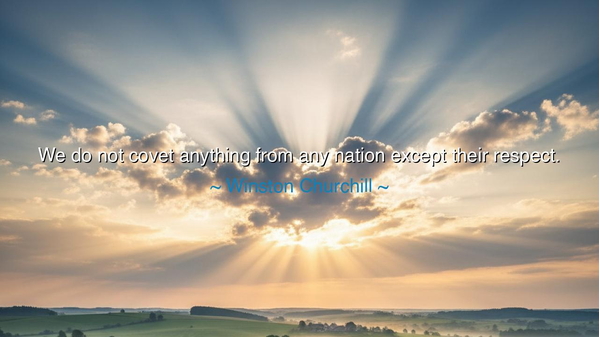
We do not covet anything from any nation except their respect.






"We do not covet anything from any nation except their respect." These words from Winston Churchill speak to a powerful and timeless truth about dignity, sovereignty, and the nature of power. Churchill, the stalwart leader of Britain during World War II, understood that true strength lies not in dominating others, but in earning their respect through integrity, wisdom, and moral fortitude. The essence of this quote is a profound statement of self-respect and honor, asserting that the only thing a nation should seek from others is the recognition of its sovereignty and the respect of its people and ideals.
In the ancient world, the concept of respect between nations and leaders was at the core of diplomatic relations. The Greeks and Romans, though often in conflict, recognized that true peace could only be achieved through mutual respect, not subjugation. In the Roman Empire, for instance, Caesar Augustus understood that maintaining respect among the various cultures under Roman rule was crucial for the stability of the empire. He employed policies of integration and tolerance to ensure that conquered peoples did not feel oppressed, but respected as equals. Like Churchill, Augustus knew that peace built on respect was stronger than peace built on fear.
Similarly, the ancient Chinese philosopher Confucius believed that the relationship between rulers and their subjects, as well as between nations, should be grounded in respect and benevolence. For Confucius, the ruler’s greatest virtue was to lead by example, fostering a society where mutual respect governed all relations. When a nation acts with honor and respect, it attracts the esteem of others and builds relationships that are grounded in trust rather than coercion. Churchill’s statement reflects the essence of Confucian wisdom: that respect, rather than power or wealth, is the most valuable asset a nation can possess.
Consider the story of Nelson Mandela, who, like Churchill, understood the importance of respect in global diplomacy. After his release from prison, Mandela could have sought revenge on the apartheid government that had oppressed him and his people, but instead, he chose a path of reconciliation and respect for all people, including those who had once been his oppressors. His ability to earn the respect of both the black and white communities in South Africa, and the world, helped guide his nation through a difficult transition. Mandela’s leadership was not about coveting anything from others, but about seeking the respect of those around him, believing that true leadership is founded on mutual respect and understanding.
Churchill’s quote also echoes the American Revolution, a pivotal moment in history where the American colonies fought not for material gain, but for the respect of their rights as individuals and as a people. The colonies sought the recognition of their sovereignty and self-determination, challenging the British Empire not out of greed or desire for land, but for the basic principle of being treated with respect. The Declaration of Independence itself speaks of this idea: that when a people are denied respect and their rights trampled upon, they are justified in seeking freedom, not out of hatred, but out of a desire for dignity.
The lesson we learn from Churchill’s words is that true power does not lie in conquest, domination, or possession, but in the ability to command respect. A nation that seeks respect rather than riches or territories builds a foundation for lasting peace and mutual understanding. When a nation is respected, its sovereignty and freedom are acknowledged, and its values are upheld by others. This is the kind of strength that cannot be won by force but must be earned through integrity, principle, and wise leadership.
In our own lives, we should strive to emulate this wisdom by seeking to earn respect rather than demanding it. Respect is not something that can be coerced or taken by force, but something that must be nurtured through our actions and character. Whether in our personal relationships, in our professional lives, or in our interactions with others, we must approach each situation with the understanding that true dignity lies in how we treat others and how we stand by our principles. We should never seek to dominate or control, but to lead by example, always remembering that respect is the most lasting and valuable form of recognition we can receive.
Churchill’s call to seek respect rather than anything else is not just a lesson in diplomacy but in living a life of honor and integrity. It reminds us that true strength is not in how much we can take from others, but in how much we can give—how much we can uplift and honor the dignity of those around us. Respect is the foundation of all great leadership, and it is earned not through power or force, but through wisdom, understanding, and a deep commitment to the principles of justice and human dignity.






AAdministratorAdministrator
Welcome, honored guests. Please leave a comment, we will respond soon